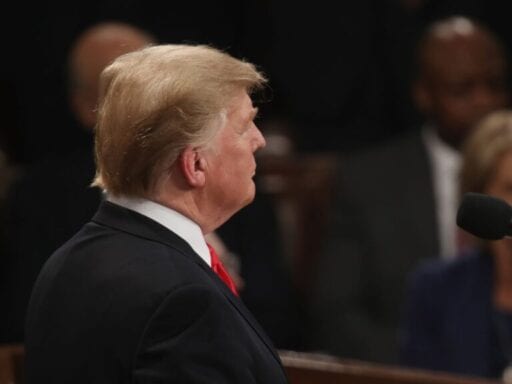During the State of the Union, the president asked lawmakers to pass the US Reciprocal Trade Act. Here’s what it would do.
When President Donald Trump brought up the topic of trade in his State of the Union address on Tuesday, he asked Congress to approve something called the “United States Reciprocal Trade Act” — a bill many Americans have probably never heard of.
This particular piece of legislation, introduced in Congress by Rep. Sean Duffy (R-WI), is the president’s latest pet project on trade.
While it sounds pretty innocuous — reciprocal trade sure sounds nice! — the legislation would give broad powers to the president to impose tariffs on foreign imports. Or as Trump put it in his speech, “If another country places an unfair tariff on an American product, we can charge them the exact same tariff on the same product that they sell to us.”
The White House and Duffy released several examples of what they see as massive trade imbalances. For example, Thailand imposes a 30 percent tariff on imported frozen french fries, but the US only imposes an 8 percent tariff on frozen fries. Under the Reciprocal Trade Act, Trump could retaliate and impose a 30 percent tariff on frozen french fries coming from Thailand.
Here is the data @realDonaldTrump shared during his meeting on the Reciprocal Trade Act today. pic.twitter.com/nylVIVqreS
— The White House (@WhiteHouse) January 24, 2019
The goal of the US Reciprocal Trade Act is to force countries to the negotiating table — basically, to continue with the example above, if the US matches Thailand’s tariffs, Bangkok will be more likely to work out a deal with Washington.
“The goal of the U.S. Reciprocal Trade Act is NOT to raise America’s tariffs but rather to encourage the rest of the world to lower theirs,” Duffy said in a statement.
The US Reciprocal Trade Act is problematic — and Congress won’t go for it anyway
The legislation is perhaps the most Trumpian of all of Trump’s protectionist trade policies. During the negotiations over NAFTA 2.0, or what became the United States-Mexico-Canada Agreement (USMCA), and in the current trade dispute with China, the president showed that he’s willing to use tariffs as a bargaining chip.
Trump often criticizes other trading partners, like China and the European Union, for “taking advantage” of the US on trade, and he’ll point to specific tariffs to make his point. For example, he has long complained about the EU’s 10 percent tariffs on foreign cars, compared to the US’s 2.5 percent.
But critics say the US Reciprocal Trade Act, as it’s currently written, is extremely problematic, and would entail giving the president enormous trade powers that he doesn’t currently have.
The bill doesn’t look at the overall trade relationship the US has with its partners, and instead “cherry-picks” specific products. The reality is all countries (including the US) put different tariffs on different products.
The US’s tariff levels have been near their lowest levels ever, as a Pew Research survey from March 2018 pointed out, but they do vary a lot depending on what’s being imported.
And once you look at the big picture, the average tariff in the US is more in line with our major trading partners, Clark Packard, a trade expert at the R Street Institute, a free market think tank, told me. He pointed to World Trade Organization data from 2016, which puts the trade-weighted average — the share of imports for each tariff — of the US at 1.7 percent, the EU at 2.0 percent, and Japan at 2.5. percent. (China’s is a little higher, at about 4 percent; you can also read Packard’s analysis here.)
“It just depends on which individual product you’re looking at,” Packard said. “The Trump administration wants to cherry-pick some of this stuff, but then our trading partners could also cherry-pick.”
What’s more, there’s nothing preventing countries from raising their own tariffs in retaliation — Thailand could put a 60 percent tariff on frozen fries, for example — which has the potential to spiral into multiple trade wars with several countries at once. That would be bad for US business and for consumers, who will absorb the impact of those price increases.
Given this, Trump’s plea on Tuesday will probably do little to motivate Congress to pass such a bill. As Vox’s Dylan Scott pointed out, “business-minded Republicans don’t like tariffs. A lot of Democrats don’t like tariffs.”
The US Chamber of Commerce, which represents American businesses, also really hates this legislation and has said it will “undermine US economic growth and elicit damaging retaliatory tariffs against US exports.”
Trump and Congress also have other tools at their disposal to fix US trade imbalances or cut down foreign barriers to trade, like free trade agreements. And as Trump asks Congress to give him more authority on trade, there’s a bipartisan push to claw back some of his trade authority by limiting the president’s ability to impose tariffs for national security reasons, the mechanism Trump used to impose steel and aluminum tariffs, including on allies, last year.
It’s almost as if Trump’s desire to consolidate his trade power has forced Congress to, well, reciprocate in kind.
Author: Jen Kirby
Read More



